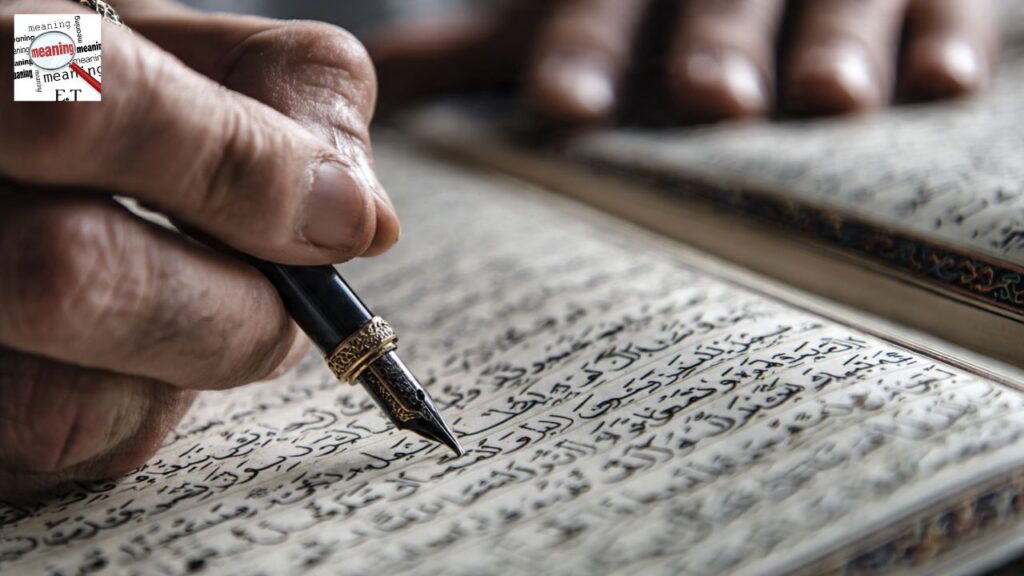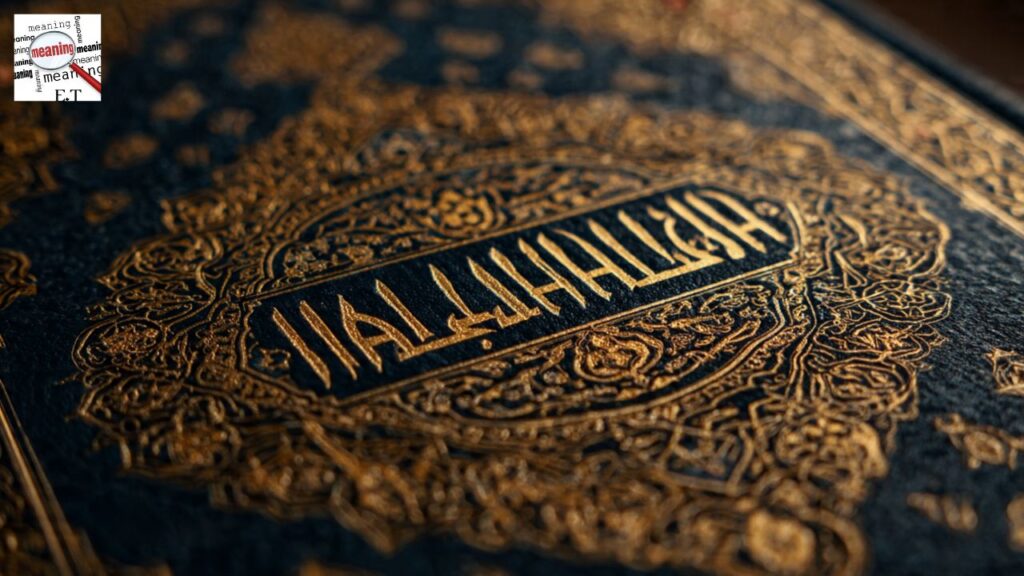Inshallah Meaning if God wills and is deeply rooted in Islamic faith. It is often used to express hope and trust in Allah’s plan. Muslims say it to show humility about the future.
The phrase reminds believers that only Allah controls what happens. It is common in daily speech, promises, and prayers. Inshallah reflects patience, faith, and divine guidance.
Inshallah Definition and Origin
Inshallah is an Arabic term meaning if Allah wills. It first appeared in the Qur’an as guidance for believers to mention God’s will when talking about the future. It shows humility and the belief that all plans depend on divine power.
Over time, Inshallah became part of daily language across Muslim cultures. It is now used worldwide as a reminder of faith, patience, and submission to Allah’s will.
What Does Inshallah Mean in English?
In English, Inshallah is commonly understood as God willing or if God wills. It reflects trust in divine will and acceptance that humans cannot control the future fully.
The phrase adds a spiritual touch to everyday speech. When used in English, it carries a sense of hope, faith, and reliance on God’s plan.
How to Say Inshallah Around the World
Inshallah is spoken in many ways across the globe. In Urdu and Hindi it is Insha Allah, in Malay and Indonesian it is Insya Allah, and in French it is Inchallah.
These differences are only in spelling and sound, not in meaning. No matter the language, the phrase expresses the same belief in Allah’s will.
What is Inshallah Meaning in Islam?
In Islam, Inshallah is more than a phrase; it is an act of faith. It shows reliance on Allah and acceptance of destiny, known as Qadr.
Muslims use it to remind themselves that only Allah controls the future. It strengthens humility, patience, and spiritual trust in daily life.
How to Use Inshallah in a Sentence?
Inshallah is often used when talking about future plans. For example, one might say, I will see you tomorrow Inshallah, linking intention with faith.
The phrase can be added to promises, hopes, and prayers. It shows respect for God’s will while expressing one’s own plans or wishes.
How to Respond to Inshallah?

When someone says Inshallah, a common response is to show agreement and respect for God’s will. People may answer with Ameen, yes, or simply smile in acknowledgment of faith.
The response depends on context, but it should always carry respect. It reflects understanding that the future belongs to Allah and human plans may change.
Why Do Muslims Always Say Inshallah?
Muslims say Inshallah to remind themselves that all future events depend on Allah’s will. It shows humility, patience, and reliance on divine power.
The phrase is also a way to connect daily life with spirituality. By saying Inshallah, Muslims keep faith alive in their conversations and actions.
Is It Permissible To Say Inshallah?
Yes, it is not only permissible but also encouraged in Islam. The Qur’an itself advises believers to say Inshallah when speaking of the future.
Using it reflects obedience, trust, and belief in destiny. It is considered an act of remembering Allah while planning for what is to come.
Inshallah in Arabic
In Arabic, Inshallah is written as إن شاء الله and pronounced insha Allah. It directly translates to if Allah wills, showing reliance on God’s command.
Arabic speakers use it in daily greetings, promises, and prayers. It is one of the most recognized and meaningful expressions in the language.
Inshallah in English
In English, the phrase is written as Inshallah or Insha Allah. The meaning stays the same, expressing hope and submission to God’s will.
Many English speakers in Muslim communities use it naturally in conversations. It bridges cultures while keeping the spiritual essence alive.
When to Use Inshallah?
Inshallah is used when talking about any future plan, from daily tasks to major events. It reflects the belief that success or failure rests with Allah.
Whether it’s making a promise, giving hope, or setting an intention, Inshallah fits naturally. It is a phrase of faith, patience, and trust in divine timing.
How to Write In Sha Allah in Correct Spelling

The correct spelling in Arabic is إن شاء الله which means if Allah wills. In English, it can appear as Inshallah, Insha Allah, or In Sha Allah, with all versions widely accepted.
Linguists suggest In Sha Allah as the closest to the original Arabic meaning. Still, all forms reflect the same faith in divine will and are recognized across Muslim communities worldwide.
The Difference Between Inshallah and Mashallah
Inshallah means if Allah wills and is used for future plans or intentions. It shows trust in divine decree and recognition that the future belongs to God.
Mashallah, on the other hand, means what Allah has willed and is said when admiring blessings or good news. Both phrases are common in Islamic culture but serve different purposes.
When Not to Say Insha’Allah
Insha’Allah should not be used to avoid responsibility or to give false promises. It is meant as a sincere expression of faith, not an excuse to delay action.
Muslims are encouraged to use it honestly, with true intention and respect for Allah’s will. Using it casually without meaning can weaken the purpose behind the phrase.
Inspirational Insha’Allah Quotes & Sayings
Insha’Allah is often shared in quotes to inspire patience, hope, and reliance on God. Many Islamic scholars and poets use it to remind believers of divine timing.
These sayings highlight that every challenge and blessing is part of Allah’s plan. Reading and sharing such quotes strengthens faith and brings comfort in daily life.
Inshallah Meaning in Hindi

In Hindi, Inshallah is written as इंशाअल्लाह and carries the same meaning if God wills. It is widely used among Hindi-speaking Muslims in India and South Asia.
The phrase shows cultural and linguistic diversity while keeping its religious essence. In both spoken and written Hindi, Inshallah reflects hope, faith, and submission to Allah’s will.
Frequently Asked Questions
What does it mean to say inshallah?
It means if Allah wills and shows hope, faith, and reliance on God’s plan for the future.
What is the meaning of inshallah in Tagalog?
In Tagalog, inshallah also means if God wills and is used by Filipino Muslims to express faith in divine will.
How do you respond to inshallah?
You can respond with Ameen, yes, or by simply agreeing with respect to Allah’s will.
Is it inshallah or mashallah?
Inshallah is used for future intentions, while mashallah is said to admire or appreciate what already exists.
Why do Muslims say inshallah?
Muslims say inshallah to acknowledge that only Allah controls the future and outcomes depend on His will.
Can non Muslims say inshallah?
Yes, non Muslims can say inshallah as a cultural or respectful expression, though it holds deeper meaning in Islam.
Is inshallah Arabic or Islamic?
Inshallah is an Arabic phrase but became central in Islamic teachings, especially through the Qur’an.
How do you write inshallah correctly?
The most accurate spelling is In Sha Allah, but Inshallah and Insha Allah are also widely accepted.
What language uses inshallah?
Inshallah originates from Arabic but is used in Urdu, Hindi, Turkish, Malay, Tagalog, and many other languages.
When should you not say inshallah?
You should avoid using inshallah insincerely or as an excuse to avoid responsibility.
Conclusion
Inshallah meaning shows humility, patience, and belief that all future plans depend on Allah’s will. It is a timeless Islamic phrase used in daily life across cultures.
The phrase carries hope, trust, and spiritual guidance, reminding believers to connect every intention with divine wisdom. Inshallah remains a symbol of faith for Muslims worldwide.









